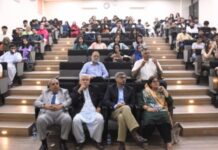KARACHI, July 31 (NNI): The Sindh government and United Nations World Food Program (WFP) have agreed to strengthen their collaboration in disaster preparedness, response, and mitigation, climate change adaptation, acute malnutrition and stunting, school meals, and expanding food silos under WFP’s five-year Country Strategic Plan.
This was agreed during a meeting between Sindh Chief Minister Syed Murad Ali Shah and United Nations World Food Program (WFP) Country Director Ms Coco Ushiyama at CM House in Karachi Wednesday.
According to a press release, the meeting was attended by Chairman P&D Najam Shah, Secretary to CM Raheem Shaikh and WFP representatives.
The Chief Minister mentioned the successful collaboration with WFP in conducting the Post Disaster Needs Assessment (PDNA) and the formulation of the 4RF (Resilient Recovery, Rehabilitation and Reconstruction Framework) for sustainable recovery in alignment with the Sindh Strategic Action Plan for Flood 2022.
WFP is also involved in disaster preparation, mitigation and reduction in Sindh. Additionally, WFP and its partners implemented a $200,000 Disaster Risk and Reduction Management Programme benefiting over 51,000 people in Dadu and Qambar-Shadadkot districts in 2023.
On the occasion, Murad Shah said that his government with the support of WFP, under the Benazir Income Support Programme (BISP), was providing various services, including nutrition, health, and social behaviour change to pregnant and breastfeeding women and their children enrolled in the program. To date, over 830,000 individuals in 140 Static and Mobile Facilitation Centers across 30 districts have been enrolled in the program.
WFP also supports the Adolescent Girls Nutrition Programme and is expanding its wheat flour fortification initiative using small-scale wheat mills under the Chakki Fortification Programme in eight districts of Sindh.
Regarding Food System Strengthening, the Sindh Chief Minister expressed the need to enhance wheat storage capacity in the province. He added that WFP, through the International Financing Corporation (IFC), was supporting the provincial Food Department to construct strategic grain reserves with a total capacity of 1.085 million MT through a Public Private Partnership to modernize storage infrastructure for efficient management of wheat reserves.
Talking about the School Meals program, the Chief Minister discussed the issue of out-of-school children and urged WFP to support pilot programs that could eventually be scaled over time. The WFP Country Director affirmed the organization’s support for the school meals programme in the province.
The Chief Minister was informed about the joint Community-Based Disaster Risk Management (CBDRM) project in Dadu and Jamshoro, and assured the release of budget support for enhancing community resilience against natural/climatic shocks.
Furthermore, with a focus on Climate Change Adaptation, the Sindh government and WFP aim to develop joint proposals/projects to access resources from entities supporting Climate Financing. Additionally, the WFP expressed readiness to support community resilience-building activities under the Sindh Coastal Resilience Project in Badin, Sujawal, and Thatta districts. NNI








































